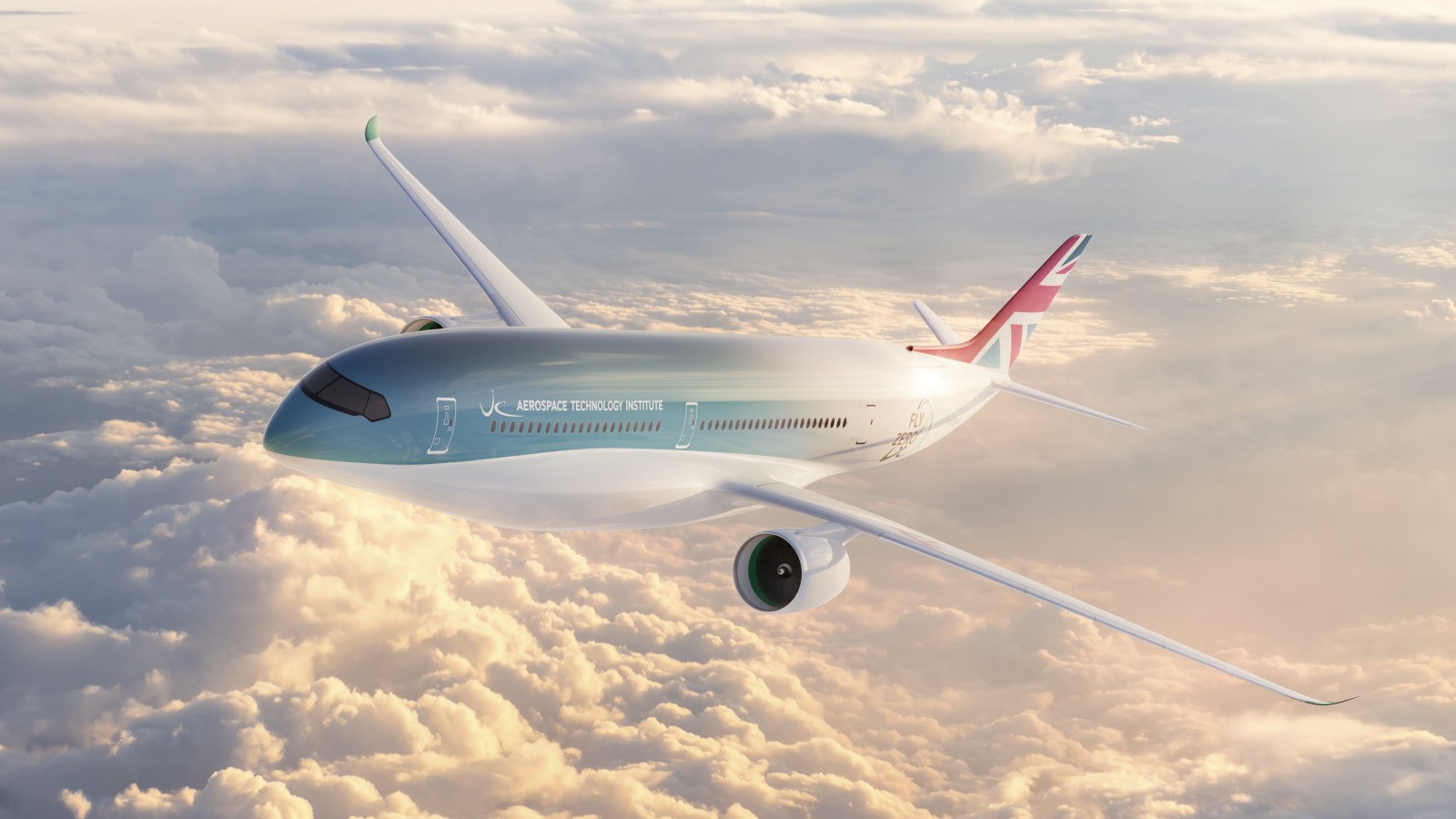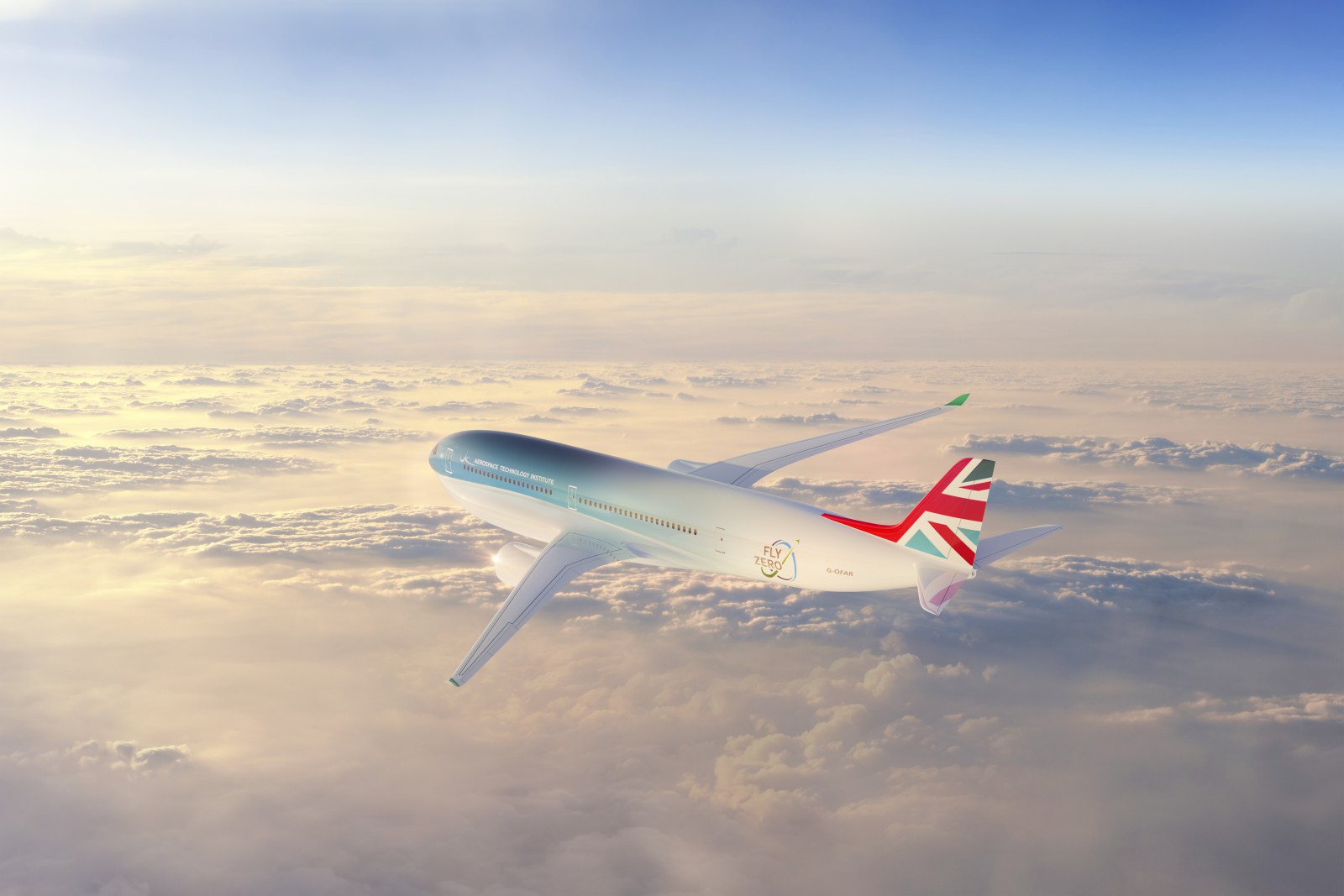FlyZero to fly one-stop to the world with zero emissions
07 December, 2021
4 min read
Industry News

Geoffrey Thomas
By joining our newsletter, you agree to our Privacy Policy


The UK's Aerospace Technology Institute (ATI) has unveiled its FlyZero project, a 279-passenger hydrogen-powered concept aircraft that could fly anywhere in the world with just one-stop and no carbon emissions.
Developed by a team of aerospace and aviation experts from across the UK collaborating on the government-backed FlyZero project, the concept demonstrates the huge potential of green liquid hydrogen for air travel not just regionally or in short-haul flights but for global connectivity says ATI.
It says that "liquid hydrogen is a lightweight fuel, which has three times the energy of kerosene and sixty times the energy of batteries per kilogramme and emits no CO2 when burned."
READ: Godfrey's tracking of MH370 gains expert support
READ: Flying like a billionaire on VistaJet
FlyZero project director Chris Gear said: “At a time of global focus on tackling climate change our midsize concept sets out a truly revolutionary vision for the future of global air travel keeping families, businesses, and nations connected without the carbon footprint.
“This new dawn for aviation brings with it real opportunities for the UK aerospace sector to secure market share, highly skilled jobs, and inward investment while helping to meet the UK’s commitments to fight climate change.”
ATI adds that while "big technological challenges exist to realize green liquid hydrogen-powered flight but there is a growing incentive and reward involved in resolving these. And with other sectors also moving towards hydrogen energy, increased demand is expected to lead to lower supply costs. A new generation of highly efficient hydrogen-powered aircraft with low fuel costs is forecast to have superior operating economics than conventional aircraft from the mid-2030s onwards."
 Through the development of concept aircraft FlyZero, it has identified the onboard technologies which, together with the infrastructure and ground equipment for refuelling, require rapid development to deliver zero-carbon emission flight. These advanced technologies include wings without fuel tanks (dry wings), hydrogen tanks, cryogenic fuel systems, fuel cells, and electrical power systems and hydrogen gas turbines.
In early 2022, ATI will detail the findings from the FlyZero project including three final aircraft concepts (regional, narrowbody and midsize), technology roadmaps, market and economic reports and a sustainability assessment. It says these outputs will help shape the future of global aviation with the intention of gearing up the UK to stand at the forefront of sustainable flight in design, manufacture, technology and skills for years to come.
Powered by liquid hydrogen, the fuel is stored in cryogenic fuel tanks at around minus 250 degrees Celsius in the aft fuselage and two smaller ‘cheek’ tanks along the forward fuselage. These cheek tanks also serve to keep the aircraft balanced as the fuel burns off and eliminate the need for any additional aerodynamic structures.
The aircraft’s 54-meter wingspan carries two turbofan engines powered by hydrogen combustion.
ABOUT ATI: The Aerospace Technology Institute (ATI) is at the heart of UK aerospace R&T. Working collaboratively across the UK aerospace sector and beyond, the Institute sets the national technology strategy to reflect the sector’s vision and ambition, supporting a range of advanced technologies with the aim of reducing aviation’s environmental impact. The ATI Programme is a joint government and industry commitment to investing £3.9 billion in research to 2026. In addition to the ATI Programme and FlyZero, the Institute also supports the supply chain through NATEP.
ABOUT FlyZero: Led by the ATI and backed by the UK Government, FlyZero is a one-of-a-kind research project aiming to realise zero-carbon emission commercial aviation by the end of the decade. The intensive 12-month strategic research programme is bringing experts together from across the UK to conduct a detailed and holistic study of the design challenges, manufacturing demands, operational requirements and market opportunity of potential zero-carbon emission aircraft concepts.
Through the development of concept aircraft FlyZero, it has identified the onboard technologies which, together with the infrastructure and ground equipment for refuelling, require rapid development to deliver zero-carbon emission flight. These advanced technologies include wings without fuel tanks (dry wings), hydrogen tanks, cryogenic fuel systems, fuel cells, and electrical power systems and hydrogen gas turbines.
In early 2022, ATI will detail the findings from the FlyZero project including three final aircraft concepts (regional, narrowbody and midsize), technology roadmaps, market and economic reports and a sustainability assessment. It says these outputs will help shape the future of global aviation with the intention of gearing up the UK to stand at the forefront of sustainable flight in design, manufacture, technology and skills for years to come.
Powered by liquid hydrogen, the fuel is stored in cryogenic fuel tanks at around minus 250 degrees Celsius in the aft fuselage and two smaller ‘cheek’ tanks along the forward fuselage. These cheek tanks also serve to keep the aircraft balanced as the fuel burns off and eliminate the need for any additional aerodynamic structures.
The aircraft’s 54-meter wingspan carries two turbofan engines powered by hydrogen combustion.
ABOUT ATI: The Aerospace Technology Institute (ATI) is at the heart of UK aerospace R&T. Working collaboratively across the UK aerospace sector and beyond, the Institute sets the national technology strategy to reflect the sector’s vision and ambition, supporting a range of advanced technologies with the aim of reducing aviation’s environmental impact. The ATI Programme is a joint government and industry commitment to investing £3.9 billion in research to 2026. In addition to the ATI Programme and FlyZero, the Institute also supports the supply chain through NATEP.
ABOUT FlyZero: Led by the ATI and backed by the UK Government, FlyZero is a one-of-a-kind research project aiming to realise zero-carbon emission commercial aviation by the end of the decade. The intensive 12-month strategic research programme is bringing experts together from across the UK to conduct a detailed and holistic study of the design challenges, manufacturing demands, operational requirements and market opportunity of potential zero-carbon emission aircraft concepts.
 Through the development of concept aircraft FlyZero, it has identified the onboard technologies which, together with the infrastructure and ground equipment for refuelling, require rapid development to deliver zero-carbon emission flight. These advanced technologies include wings without fuel tanks (dry wings), hydrogen tanks, cryogenic fuel systems, fuel cells, and electrical power systems and hydrogen gas turbines.
In early 2022, ATI will detail the findings from the FlyZero project including three final aircraft concepts (regional, narrowbody and midsize), technology roadmaps, market and economic reports and a sustainability assessment. It says these outputs will help shape the future of global aviation with the intention of gearing up the UK to stand at the forefront of sustainable flight in design, manufacture, technology and skills for years to come.
Powered by liquid hydrogen, the fuel is stored in cryogenic fuel tanks at around minus 250 degrees Celsius in the aft fuselage and two smaller ‘cheek’ tanks along the forward fuselage. These cheek tanks also serve to keep the aircraft balanced as the fuel burns off and eliminate the need for any additional aerodynamic structures.
The aircraft’s 54-meter wingspan carries two turbofan engines powered by hydrogen combustion.
ABOUT ATI: The Aerospace Technology Institute (ATI) is at the heart of UK aerospace R&T. Working collaboratively across the UK aerospace sector and beyond, the Institute sets the national technology strategy to reflect the sector’s vision and ambition, supporting a range of advanced technologies with the aim of reducing aviation’s environmental impact. The ATI Programme is a joint government and industry commitment to investing £3.9 billion in research to 2026. In addition to the ATI Programme and FlyZero, the Institute also supports the supply chain through NATEP.
ABOUT FlyZero: Led by the ATI and backed by the UK Government, FlyZero is a one-of-a-kind research project aiming to realise zero-carbon emission commercial aviation by the end of the decade. The intensive 12-month strategic research programme is bringing experts together from across the UK to conduct a detailed and holistic study of the design challenges, manufacturing demands, operational requirements and market opportunity of potential zero-carbon emission aircraft concepts.
Through the development of concept aircraft FlyZero, it has identified the onboard technologies which, together with the infrastructure and ground equipment for refuelling, require rapid development to deliver zero-carbon emission flight. These advanced technologies include wings without fuel tanks (dry wings), hydrogen tanks, cryogenic fuel systems, fuel cells, and electrical power systems and hydrogen gas turbines.
In early 2022, ATI will detail the findings from the FlyZero project including three final aircraft concepts (regional, narrowbody and midsize), technology roadmaps, market and economic reports and a sustainability assessment. It says these outputs will help shape the future of global aviation with the intention of gearing up the UK to stand at the forefront of sustainable flight in design, manufacture, technology and skills for years to come.
Powered by liquid hydrogen, the fuel is stored in cryogenic fuel tanks at around minus 250 degrees Celsius in the aft fuselage and two smaller ‘cheek’ tanks along the forward fuselage. These cheek tanks also serve to keep the aircraft balanced as the fuel burns off and eliminate the need for any additional aerodynamic structures.
The aircraft’s 54-meter wingspan carries two turbofan engines powered by hydrogen combustion.
ABOUT ATI: The Aerospace Technology Institute (ATI) is at the heart of UK aerospace R&T. Working collaboratively across the UK aerospace sector and beyond, the Institute sets the national technology strategy to reflect the sector’s vision and ambition, supporting a range of advanced technologies with the aim of reducing aviation’s environmental impact. The ATI Programme is a joint government and industry commitment to investing £3.9 billion in research to 2026. In addition to the ATI Programme and FlyZero, the Institute also supports the supply chain through NATEP.
ABOUT FlyZero: Led by the ATI and backed by the UK Government, FlyZero is a one-of-a-kind research project aiming to realise zero-carbon emission commercial aviation by the end of the decade. The intensive 12-month strategic research programme is bringing experts together from across the UK to conduct a detailed and holistic study of the design challenges, manufacturing demands, operational requirements and market opportunity of potential zero-carbon emission aircraft concepts.Next Article
2 min read
Qantas triples profit but misses mark

Get the latest news and updates straight to your inbox
No spam, no hassle, no fuss, just airline news direct to you.
By joining our newsletter, you agree to our Privacy Policy
Find us on social media
Comments
No comments yet, be the first to write one.
